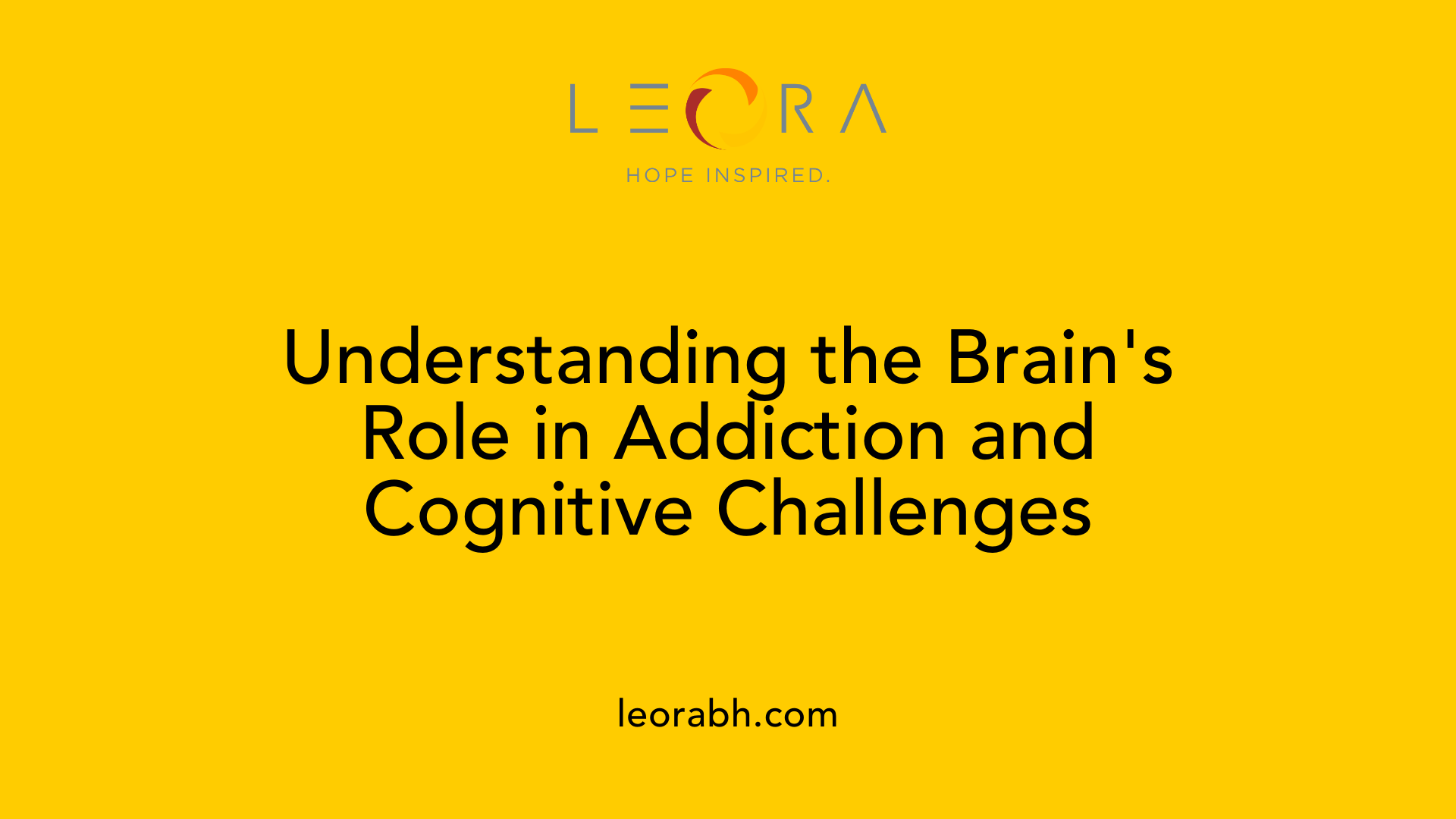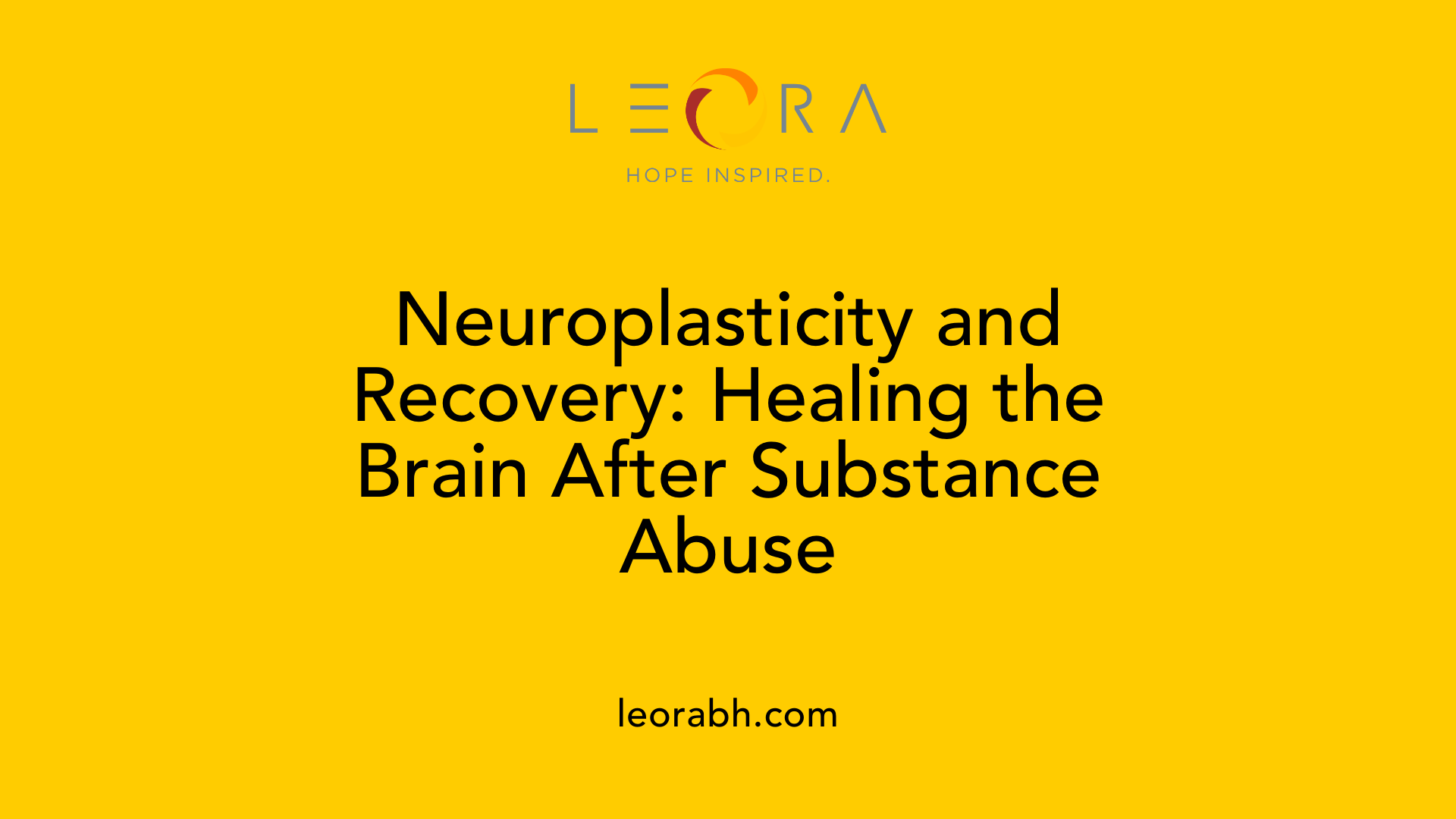How substance use affects memory, mood, and cognition
Unraveling the Neurological Impact of Substance Abuse on Mental Functions
Understanding the Complex Effects of Drugs on Brain and Behavior
Substance use profoundly influences memory, mood, and cognition through intricate neurological mechanisms. From altering brain structures involved in reward and decision-making to producing long-lasting cognitive deficits, drugs can detrimentally reshape neural circuits. This article explores how substances affect the brain's architecture, neurotransmitter systems, and neural plasticity, ultimately impairing mental health and cognitive function. By examining the neurobiological foundations of addiction and associated cognitive changes, we aim to shed light on the challenges of recovery and the potential strategies for restoring brain health.
Neuroanatomy of Addiction and its Link to Cognitive Impairments

What part of the brain controls addiction, and how does it relate to cognitive functions?
Addiction involves multiple brain regions, notably the nucleus accumbens, ventral tegmental area (VTA), amygdala, hippocampus, and particularly the prefrontal cortex. These areas work together to mediate reward processing, impulse control, learning, and decision-making. The mesolimbic dopamine pathway, which runs from the VTA to the nucleus accumbens, plays a crucial role in reinforcing drug use by producing pleasurable sensations. Dysfunction in the prefrontal cortex impairs judgment, planning, and behavioral regulation, making individuals more prone to compulsive drug-seeking. Memory-related structures like the hippocampus and amygdala contribute to craving and conditioned responses, forming associations that can trigger relapse. The interaction among these regions results in complex neural circuits that support both addictive behaviors and related cognitive impairments.
How does substance use impact memory, mood, and cognitive functions?
Substance use profoundly alters neural pathways, leading to deficits in learning, memory, attention, impulse control, and emotional regulation. Initially, some drugs may temporarily enhance alertness or focus, but long-term use causes damage to critical areas such as the prefrontal cortex, hippocampus, amygdala, and striatum. These alterations impair working memory, response inhibition, and decision-making, often increasing impulsivity and emotional instability. Chronic use induces neuroplastic changes—such as decreased receptor sensitivity and structural damage—hindering recovery and elevating risk for mental health conditions like depression and anxiety. During withdrawal, these cognitive and mood disturbances tend to intensify, further complicating treatment and recovery efforts.
What are the neurological effects of drug use on mental processes?
Drug abuse impacts brain function at the cellular and molecular levels, primarily through disrupting neurotransmitter systems involving dopamine, serotonin, and glutamate. These chemicals regulate mood, motivation, reward, and cognition. Repeated drug use leads to neuroadaptations such as decreased receptor sensitivity, impaired signaling pathways, and structural brain changes including neural loss and inflammation. These changes give rise to cognitive deficits—such as impaired memory, attention, and executive function—as well as emotional disturbances. In some cases, damage can be irreversible, contributing to conditions like Wernicke-Korsakoff syndrome, especially with alcohol, or structural brain deterioration seen with methamphetamine and cocaine. These effects underscore how addiction leaves a lasting mark on mental processes.
How does substance abuse affect emotional regulation and mental health?
Substance abuse impairs the neural circuits responsible for emotional regulation and mental stability. Long-term use disrupts neurotransmitter balance—particularly dopamine, serotonin, and gamma-aminobutyric acid (GABA)—leading to mood swings, anxiety, depression, and personality changes. The neurochemical fluctuations produce temporary euphoria but often result in deteriorated mental health over time. Moreover, addiction frequently co-occurs with mental health disorders such as depression, anxiety, and psychosis, which can be exacerbated by continued substance use. This interplay creates a vicious cycle, making treatment challenging and emphasizing the importance of addressing both addiction and comorbid conditions for effective recovery.
How do drugs affect memory and cognitive development?
Drugs interfere with the processes underlying learning and memory by causing structural and functional changes in critical brain regions like the hippocampus, prefrontal cortex, and amygdala. Chronic use impairs neuroplasticity, neurogenesis, and neurotransmitter functions involving dopamine, glutamate, and neurotrophic factors like brain-derived neurotrophic factor (BDNF). These disruptions lead to deficits in attention, working memory, decision-making, and cognitive flexibility. Exposure during vulnerable developmental periods—prenatal, childhood, adolescence—can produce persistent deficits and structural brain alterations, increasing susceptibility to future addiction. While some acute effects may temporarily boost certain cognitive functions, long-term consequences generally involve significant impairments across multiple domains.
What are the signs of brain damage caused by drug abuse?
Indicators of brain damage include memory loss, difficulty with judgment, impaired problem-solving, and emotional instability. Neuroimaging may reveal abnormal findings such as white matter damage, atrophy, or acute lesions like infarctions, especially in cases of overdose. Clinical signs include coordination issues, hallucinations, seizures, and delayed reaction times. Specific conditions like Wernicke-Korsakoff syndrome, linked to long-term alcohol abuse, involve profound memory impairments. Cocaine overdose can cause cerebrovascular events, leading to stroke-related deficits. Early detection and cessation of drug use, along with medical intervention, can sometimes reverse or mitigate some of these impairments, but ongoing damage may be permanent if left untreated.
Impact of Long-Term Substance Abuse on Brain Structures and Neurotransmission

How does substance use impact memory, mood, and cognitive functions?
Long-term substance use has profound effects on the brain’s capacity to support memory, mood regulation, and cognitive abilities. Chronic drug exposure causes structural damage to critical regions such as the prefrontal cortex, hippocampus, amygdala, and striatum. These areas are central to learning, memory formation, emotional regulation, and decision-making.
The alterations in neurotransmitter systems, especially dopamine, serotonin, and glutamate, disrupt normal neural communication. This leads to impairments in attention, impulse control, working memory, and problem-solving skills. Users often experience emotional instability, increased anxiety, depression, and impulsivity, worsened during withdrawal periods.
Over time, these neurobiological changes hinder daily functioning and contribute to vulnerability to mental health disorders, including psychosis and mood disorders. Such cognitive impairments not only diminish quality of life but also make recovery more challenging, as they interfere with learning new skills and maintaining behavioral changes necessary for sobriety. Overall, substance use disorders are intertwined with enduring disturbances in brain circuits governing mood and cognition.
What are the neurological effects of drug use on mental processes?
Drugs alter the brain’s neurobiology by causing significant disruptions in neurotransmitter function. The brain’s reward system, primarily involving dopamine pathways, becomes hyperactivated, reinforcing drug-seeking behaviors and fostering addiction.
Repeated use leads to adaptive changes like decreased receptor sensitivity, reduced receptor numbers, and impaired signaling pathways. Structural changes include reduced volume of the hippocampus and prefrontal cortex, along with white matter degeneration, impairing cognitive capacities.
These neuroadaptations result in deficits across various mental processes: memory loss, diminished attention span, difficulty in executive functioning, and impaired decision-making. Certain neurological effects, like Wernicke-Korsakoff syndrome, can cause irreversible damage resulting in profound memory impairment.
Furthermore, structural brain changes, including atrophy and disrupted neural connectivity, contribute to the persistent cognitive deficits seen in addiction. These alterations highlight the severe and lasting impact drugs have on mental processes.
How does substance abuse affect emotional regulation and mental health?
Substance use significantly influences emotional regulation by disrupting the balance of neurochemical systems that modulate mood and impulse control. Persistent drug abuse leads to changes in dopamine, serotonin, and GABA levels, which play vital roles in mood stabilization.
Chronic use impairs the functioning of the prefrontal cortex and limbic circuits, increasing emotional instability, anxiety, depression, and irritability. Many individuals experience heightened mood swings and difficulty managing stress.
Additionally, substance use disorders are often comorbid with mental health conditions such as depression and anxiety, creating a vicious cycle. Substance-induced neurochemical fluctuations temporarily elevate mood but ultimately exacerbate emotional dysregulation when drug effects subside.
These neurobiological and psychological impacts can hinder treatment progress and recovery if not addressed in tandem. It underscores the importance of integrated approaches to treat both substance abuse and co-occurring mental health issues.
How do drugs affect memory and cognitive development?
Drug exposure during critical developmental stages, including prenatal, childhood, and adolescence, causes long-lasting impacts on cognition and brain architecture. The hippocampus, prefrontal cortex, and amygdala—which govern learning, memory, judgment, and emotional response—are particularly vulnerable.
Chronic drug use impairs neuroplasticity and neurogenesis, primarily by disrupting neurotransmitter systems such as dopamine and glutamate. These disruptions hinder the brain’s ability to create and strengthen neural connections, essential for adaptive learning.
Developmental drug exposure results in persistent deficits in attention, working memory, and decision-making. Neonatal and adolescent brains are especially sensitive; drug-induced changes during these periods increase susceptibility to addiction later in life.
While some drugs might temporarily enhance certain cognitive functions, the long-term consequences tend to include cognitive decline, difficulty in learning new information, and impaired cognitive flexibility.
What are the signs of brain damage caused by drug abuse?
Indicators of neurological damage from drug abuse include forgetfulness, poor judgment, reduced problem-solving ability, and emotional volatility. Patients might display motor coordination issues, hallucinations, seizures, or speech problems.
Imaging studies often reveal structural injuries such as cerebral atrophy, white matter degeneration, and specific lesions. Conditions like Wernicke-Korsakoff syndrome, associated with alcohol abuse, exemplify how deficiency-related brain damage can cause severe memory impairment.
Depending on the substance and duration of use, signs can also include decreased reaction times, impaired visual-spatial skills, and increased risk of stroke or psychiatric conditions such as paranoia and psychosis.
Early detection and cessation can sometimes reverse or halt further damage, but extensive use often results in permanent neurological deficits.
| Brain Regions Affected | Substance-Related Changes | Consequences for Cognition | Additional Notes |
|---|---|---|---|
| Hippocampus | Volume reduction, impaired neurogenesis | Memory deficits, poor consolidation | Affected by alcohol, cannabis, opioids |
| Prefrontal Cortex | Reduced size, connectivity, activity | Decision-making, impulse control issues | Impacted by cocaine, meth, alcohol |
| Amygdala | Altered activity | Emotional regulation problems | Affected by stimulants and alcohol |
| Striatum | Dysregulation of reward pathways | Reinforcement of drug cravings | Key in addiction pathways |
| White Matter | Degeneration, lesions | Impaired communication between brain regions | Seen in long-term drug use |
Understanding these effects emphasizes the importance of preventative measures, early intervention, and tailored rehabilitation strategies to address neurocognitive deficits resulting from addiction.
Neuroplasticity, Neurogenesis, and the Brain’s Capacity for Recovery

How does substance use impact memory and cognitive development?
Substance use significantly affects memory and cognitive growth by causing long-term changes in brain structures essential for learning, memory, and decision-making processes. Key areas like the hippocampus, prefrontal cortex, and amygdala undergo structural and functional alterations due to chronic drug exposure. These changes impede neuroplasticity—the brain’s ability to adapt and reorganize—and suppress neurogenesis, the birth of new neurons, particularly in regions vital for memory formation.
Drugs interfere with neurotransmitter systems, especially dopamine and glutamate, along with neurotrophic factors such as brain-derived neurotrophic factor (BDNF). This disruption hampers the formation of new synaptic connections, leading to deficits in attention, working memory, and cognitive flexibility. Exposure during critical developmental periods like prenatal stages, childhood, or adolescence can produce enduring cognitive impairments and structural brain abnormalities, increasing the likelihood of future substance abuse.
While some substances may temporarily enhance certain cognitive functions, long-term and heavy use generally results in widespread impairments. These deficits manifest as poor decision-making, decreased impulse control, and diminished learning capacity, all of which reinforce maladaptive behaviors characteristic of addiction. Overall, drug-induced neurochemical and structural brain changes can severely compromise cognitive development and functioning, with lasting consequences that challenge recovery.
What is the potential for recovery of brain function after substance abuse?
Despite the extensive damage caused by substance abuse, the brain’s inherent ability to heal itself offers hope for recovery. Neuroplasticity—the process by which neural circuits are rewired and reorganized—is central to this regenerative potential. With sustained abstinence, the brain can gradually restore some functions through neurogenesis and synaptic plasticity.
Activities such as physical exercise, environmental enrichment, and cognitive training have been shown to stimulate neurogenesis, especially in the hippocampus. These interventions promote the growth of new neurons, strengthen synaptic connections, and restore neural pathways involved in memory, executive functioning, and emotional regulation.
While some chemical and structural modifications in the brain may be long-lasting or only partially reversible, evidence indicates significant improvements are possible with proper treatment. Behavioral therapies, cognitive remediation, and supportive environments help facilitate neural recovery. These strategies reduce maladaptive pathways and foster the development of healthier neural networks.
Understanding these recovery mechanisms highlights the importance of early intervention and ongoing rehabilitation efforts. Enhancing neuroplasticity through lifestyle modifications and therapy can not only diminish cognitive deficits but also reinforce resilience against relapse.
How does neuroplasticity contribute to both the challenges of addiction and the potential for recovery?
Neuroplasticity underpins both the difficult nature of addiction and the hope for overcoming it. During addiction development, repeated drug use induces maladaptive neuroplastic changes that alter reward, motivation, and habit circuits. These changes embed drug-seeking behaviors deeply into neural pathways, making relapse more likely even after periods of sobriety.
This process is driven by the strengthening of synaptic connections in the brain’s reward centers, especially involving dopamine pathways, which reinforce the association between environmental cues and drug effects. As a result, cravings are triggered by cues, and control over impulses diminishes, creating a cycle that sustains addiction.
Paradoxically, neuroplasticity also allows the brain to recover. Behavioral interventions, environmental modifications, and neurorehabilitative therapies can reshape these neural circuits. By weakening the pathways linked to drug craving and strengthening those involved in healthy decision-making and impulse control, it’s possible to diminish addiction behaviors.
Strategies such as cognitive training, mindfulness practices, physical activity, and social support tap into neuroplastic capacities. These efforts promote the formation of new, adaptive neural pathways, facilitating behavioral change and reducing relapse risk.
This dual role of neuroplasticity emphasizes that while addiction rewires the brain unfavorably, it also provides a window of opportunity for recovery. Early and sustained intervention is critical to leverage the brain’s ability to heal and rewire itself toward healthier functioning.
Addressing Cognitive and Mental Health Challenges in Addiction Recovery
The profound impact of substance use on brain structure and function underscores the necessity of comprehensive treatment approaches. Recognizing the neurobiological underpinnings of addiction reveals targets for pharmacological and behavioral therapies aimed at restoring cognitive abilities and emotional stability. While chronic drug use can cause lasting damage, the brain’s plasticity offers a window of opportunity for recovery through sustained abstinence, cognitive rehabilitation, and supportive environments. Early intervention, combined with strategies to promote neurogenesis and synaptic repair, can facilitate neural rewiring, leading to improved memory, decision-making, and emotional regulation. Ultimately, understanding how substances affect the brain helps guide more effective treatments, offering hope for individuals seeking to reclaim their cognitive health and mental well-being.
References
- Addiction and Cognition - PMC
- Cognitive Impairment in Substance Use Disorders - PMC
- How Do Drugs and Alcohol Affect the Brain and Central Nervous ...
- Addictive drugs modify neurogenesis, synaptogenesis and synaptic ...
- Can Addiction Affect Learning and Memory? - Cumberland Heights
- Mental Health Impact of Drug Addiction on Cognition | RAC
- Brain and Cognition for Addiction Medicine: From Prevention to ...
- Cognition is central to drug addiction
- Cognitive dysfunction in adolescents with substance use disorder
- How Substance Use Disorder Affects Your Memory - Harris House
Find Your Inner Light
Related Articles
Schedule an Assessment
Leora Behavioral Health provides comprehensive treatment services, including ambulatory detox, mental health IOP, and SUD IOP, to support your journey toward lasting recovery.
Our caring team will guide you through the admissions process and create a personalized treatment plan tailored to your unique needs. We welcome walk-ins. If you or a loved one is struggling, reach out today. We’re here to help.


.svg)




.svg)
.svg)
.svg)
.svg)
